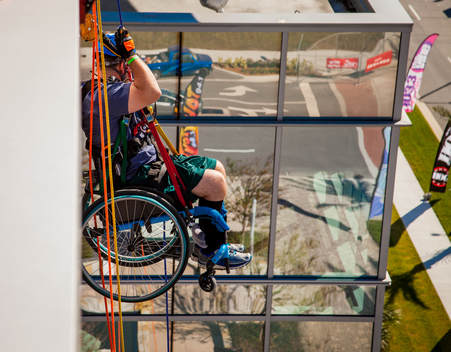 Not only did Stephen Watkins sign up as an Edger and go Over the Edge at ONE DAYTONA in 2017, he did so in his wheelchair! The stunned crowd stood speechless that morning at the bottom of the eight-story International Motorsports Center, until the roars and cheers began flooding up. Here’s Stephen’s take on his rappelling experience: Why did you decide to be an Edger in Over the Edge at ONE DAYTONA last year? I decided to become an Edger for Over the Edge because I thought it was a great opportunity to bring awareness to disabilities. It was a way to show the community we can do anything we want to. What was the most exciting part of being an Edger? The most exciting part of the experience was the thrill of repelling down the building. Being able to look out and enjoy the view from so high up, it's a sight I'll never forget. What was the most meaningful part of rappelling for you? When I first became a paraplegic and was wheelchair bound I did not think that I could do a lot of activities I did before. This event proved my thinking wrong. It showed that I can do anything, and any wheelchair bound person can do anything…we just do it differently. I think this is what Easterseals stands for. They assist families with disabilities and help them know they can do anything they want. What were some of the reactions you heard from others about going "Over the Edge"? The most common reaction I received from friends was, “How did you repel in a wheelchair?" or "Why would you want to repel down an eight-story building?" In the end, everyone loved the opportunity I’d been given: to show that people with disabilities can do anything. What would you say to encourage others who may be hesitant to consider being an Edger in the Nov. 3 event? I would tell them to take the risk and don't think about anything else. Being up there is a feeling you can't get anywhere else; it’s a rush many people never experience. The thrill, fun and excitement you get is something you don’t want to miss out on! Why is supporting the work of The NASCAR Foundation and Easterseals important to you? Supporting Easterseals and NASCAR Foundation is important to me because they assist people who are sick and who have disabilities. They help with awareness and spreading the word. Most of all, it's important because they don't define a person by his disabilities. They see the person inside them and push them to do whatever it is they desire. *** Over the Edge at ONE DAYTONA is the area’s only rappelling fundraising event and benefits The NASCAR Foundation and Easterseals. In 2017, Over The Edge At ONE DAYTONA raised $200,000 for The NASCAR Foundation and Easterseals of Northeast Central Florida, and more than 100 rappelers were brave for courageous kids. To be a rappeler, you simply need to raise $1,000 for a spot on the ropes and you’re in! Start fundraising with family and friends early and, dollar by dollar, you’ll reach your goal. All 2017 rappelers earned their spots! And, we give you all the tools you need to reach out to friends, family, co-workers and neighbors – the words and pictures that tell the story of your new adventure. Register to be a rappeler here: https://daytonaovertheedge.org/selfregister.cfm It’s simply a one-of-a-kind event in our community, and this year’s edition of Over the Edge at ONE DAYTONA will be the most thrilling yet. Don’t miss out! Share the news and join the adventure. Visit http://daytonaovertheedge.org or visit our Facebook page to learn more.
0 Comments
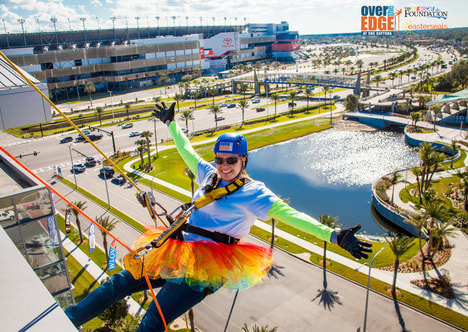 Sponsoring, rappelling and volunteering are a few of the fantastic and easy ways the individuals and the business community can support Over the Edge at ONE DAYTONA on Nov. 2-3, 2018. These gifts of time, talent and treasure – as well as a healthy sense of adventure – will directly benefit children served by The NASCAR Foundation and Easterseals of Northeast Central Florida. Over the Edge at ONE DAYTONA is the area’s only rappelling fundraising event and benefits The NASCAR Foundation and Easterseals. In 2017, Over The Edge At ONE DAYTONA raised $200,000 for The NASCAR Foundation and Easterseals of Northeast Central Florida, and more than 100 rappelers were brave for courageous kids. The funds supported children with medical needs and disabilities, filling several funding and service gaps in our communities. Consider becoming a sponsor of this year’s event; there are several levels to choose from. Get details here: https://daytonaovertheedge.org/sponsors.cfm Over the Edge at ONE DAYTONA is easy to participate in! To be a rappeler, you simply need to raise $1,000 for a spot on the ropes and you’re in! Start fundraising with family and friends early and, dollar by dollar, you’ll reach your goal. All 2017 rappelers earned their spots! And, we give you all the tools you need to reach out to friends, family, co-workers and neighbors – the words and pictures that tell the story of your new adventure. Register to be a rappeler here: https://daytonaovertheedge.org/selfregister.cfm Being a rappeler isn’t your thing? We still need event volunteers! Over the Edge at One Daytona has many volunteer roles that need to be filled during its Nov. 2-3, 2018 event, including registration, staging, escorts, announcers and hospitality. There also are limited spots (with opportunity for a FREE rappel) for experienced and qualified rope volunteers to work with Over the Edge's technical staff on event days. (Qualified volunteers must have experience with rope safety systems including but not limited to: rock climbing instruction, high angle rescue, ropes course facilitation, industrial rope access, rappel training in military or law enforcement, etc.) Plus, we always need a loud cheering section at Over the Edge at ONE DAYTONA, too. Join us as we back our rappelers by shouting love and support from the ground, up! Sign up to volunteer here: https://daytonaovertheedge.org/volunteer.cfm Over the Edge at ONE DAYTONA is fun and adventurous, and we want you to have the opportunity to experience it firsthand! Though fundraising dinners have their appropriate place, Over the Edge at ONE DAYTONA lets participants live out their generosity in such a daring way that the excitement is contagious! It’s simply a one-of-a-kind event in our community and this year’s edition of Over the Edge at ONE DAYTONA will be the most thrilling yet. Don’t miss out! Share the news and join the adventure. Visit http://daytonaovertheedge.org or visit our Facebook page to learn more. 8/28/2018 Celebrating Labor Day: How Adults with Disabilities Contribute to our National ProsperityRead Now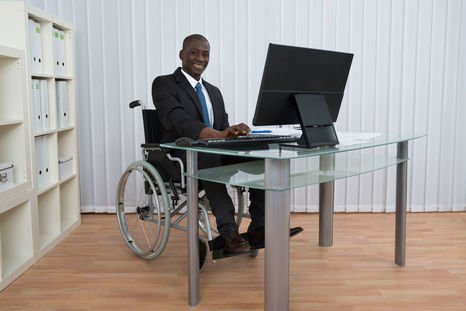 Labor Day, the first Monday in September, is dedicated to the social and economic achievements of American workers. It constitutes a yearly national tribute to the contributions workers have made to the strength and well-being of our country. Plus, it’s a great excuse for a barbeque! Though many of us think of the traditionally able-bodied worker when they think of celebrating the national holiday, we at Easterseals are mindful that an impressive portion of our American workforce is comprised of adults with disabilities who are living successful, productive lives and contributing to America’s prosperity. Still, the statistically low employment of adults with disabilities show us the untapped potential of the workforce. “Like any individual, a person with a disability has unique talents and abilities that can contribute significantly to an employer’s bottom line,” wrote Debbie Bell, writer for the Los Angeles Business Journal. “Inclusion of people with disabilities in the workforce is not only good for business but our society as a whole. When people are employed they gain self-sufficiency, including the ability to pay rent or buy a home, patronize stores, pay taxes and contribute economically to our communities and nation.” (Read the entire article here.) Bell added that a common myth surrounding employing someone with a disability is the cost related to providing ADA-compliant accommodations. However, she wrote, most accommodations cost less than $500, and research shows that those who employ people with disabilities see a $28 return on investment in these accommodations. What’s more: The turnover rate for employees with disabilities is 8 percent, as compared to 45 for other employees. The 2016 Annual Disability Statistics Compendium revealed that Florida businesses could do better in employing people with disabilities. Florida ranks 39th in the 50-state ranking, with an employment rate of 39.1. Compared with Wyoming, the leader, which boasts a 57.1 employment rate for employees with disabilities. How can we all help? One way Easterseals advocates for those with disabilities is by assisting members of Congress and their staff, White House and federal agency officials, and representatives of other national interests -- as well as citizens like you -- to understand and act in support of policies and programs that help people with disabilities to live with equality, dignity and independence. Join Easterseals today in educating and informing public officials about issues that affect individuals with disabilities. Join our Legislative Action Network at http://www.easterseals.com/necfl/get-involved/advocacy/ to get started. This Labor Day, let us celebrate all the American workers who usher in prosperity to the United States of America and recognize the incredible value individuals with disabilities bring to our thriving economy. 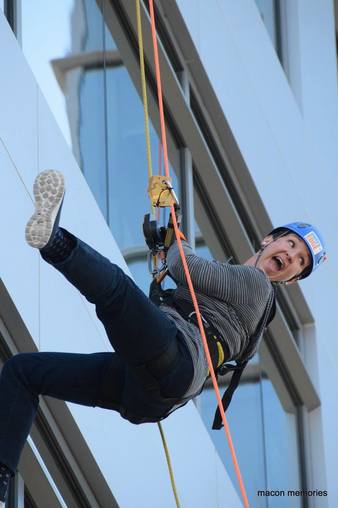 Vickie Pleus has been an Easterseals supporter through her public-relations business for many years. And in 2017, she took the devotion to a new height when she signed up as an Edger in the inaugural Over the Edge at One Daytona event last November. “I loved the rappelling fundraiser idea from the moment I first heard it,” says Vickie. “What’s better than getting adventurous and raising money for worthy causes simultaneously? I don’t need many reasons for having fun, but this one seemed like a no-brainer.” Vickie recalls being full of confidence about rappelling for weeks beforehand as she raised $1,000 to earn her Edger position. Generous family and friends continued contributing to the fundraising effort, and as the days passed, Vickie knew she had a spot on the ropes. But, it wasn’t until she was harnessed and on the rooftop that it really sunk in. “I remember being safely harnessed and hearing the Over the Edge staff direct me, step by step, to put my heels over the edge of the building and lean back,” says Vickie. “It was comical! I tried to make myself lean into the harness that way I was supposed to and my body wasn’t having anything to do with that idea.” Once her body caught up with her brain, says Vickie, it only took a minute for her to get the hang of the rappelling. She danced down the building as she was lowered to the ground. “I was kicking and laughing and posing for photos like a fool, all the way down International Motorsports Center,” said Vickie. “It was such a rush and so fun, just as I had anticipated it would be. It’s completely safe up there and just knowing that my $1,000 was going to help two worthy organizations…it was an overall amazing experience. “If you’re considering being an Edger and rappelling in the Nov. 3 event, don’t hesitate,” she says, “You’ll never forget it and you’ll have great stories for years.” _______________________________________________________________________ The first 140 fundraisers to raise a minimum of $1,000 in donations will earn a spot to go Over The Edge At ONE DAYTONA on November 3, 2018. All monies raised will be shared equally between The NASCAR Foundation and Easterseals Northeast Central Florida - strong, local, 501(c)3 charity partners who are equally dedicated to providing healthcare and services to children in our community who need it most! Space is limited, so fire up the adrenaline and act now! https://daytonaovertheedge.org/selfregister.cfm 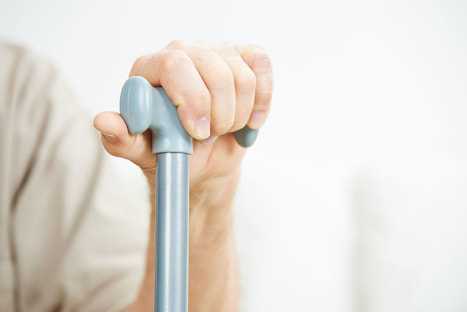 The next time you’re with a group of adults – in line at the grocery story, waiting in the dentist’s office or perusing the shelves in the library – look around. Twenty-five percent of those you see likely has a disability. And, there’s a high chance you do, too. A recent story by CBS News states that one in four adults in the United States has a disability. The story cited the Centers for Disease Control and Prevention, which recently reported that the most common form of disability in adults is mobility, and it significantly increases with age, too. Hearing impairment is nearly as common. Many believe that Easterseals of Northeast Florida only helps children with disabilities, but in fact, Easterseals serves children and adults. Easterseals serves adults and seniors through several programs it offers throughout Northeast Central Florida, to include Deaf and Hard of Hearing Services and sign-language classes, as well as partnering with the Florida Telecommunications Relay, Inc. program to provide specialized communications equipment (telephones and more) to qualified Florida residents who have hearing impairment. Further, Easterseals’ Community Equipment Loan Closet is a community resource of equipment intended to support adults, children and caregivers living with physical challenges or disabilities. All equipment is loaned at no charge; Easterseals asks individuals to make a small donation to support the program. The Community Equipment Loan Closet provides canes, crutches, shower chairs and benches, folding walkers, four-wheel walkers with seats and wheelchairs. It also accepts donations. Easterseals serves the whole family and is proud to do so. With so many of us, our neighbors, family and friends living with disabilities, Easterseals aims to be a partner in supporting the independence of every person. To learn more about Easterseals services for adults and seniors, call 386-255-4568, toll-free at 877-255-4568 or via video phone at 386-310-1157. 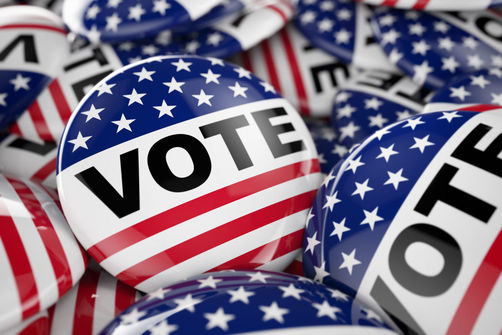 Throughout the Sunshine State, eager candidates are peppering rights-of-way with red, white and blue elections signs. They’re signs of the time as August 28 is Primary Election Day in Florida quickly approaches. Easterseals encourages members of the community to voice their support of causes and programs that help people with disabilities achieve independence and reach their potential. (Learn more on how to be an advocate for those with disabilities.) Below is a recent blog post by Beth Finke, Interactive Community Coordinator at Easterseals Headquarters, about how we can collectively work to bring issues that matter to people with disabilities into the spotlight. Where to we start? Beth knows. Read on… How Can We Bring Disability Issues to the Forefront of Elections? By Beth Finke With cyber concerns in the news these days, many polling places are considering returning to paper ballots in future elections. I get that, but here’s the thing: many people with disabilities cannot mark paper ballots without assistance. I’m one of those people. I am blind, and without being able to read a paper ballot, I rely on special voting machines equipped with earphones in order to vote privately and independently. But now, according to Michelle Bishop, a voting rights advocate for the National Disability Rights Network, the return to paper ballots in polling places could make poll workers less comfortable with operating machine-based systems. In a Stateline article, Bishop pointed out that with half of Americans voting using paper ballots now, untrained poll workers are discouraging the use of accessible voting machines at the polling places. From the article: “It’s a constant complaint from voters with disabilities nationwide,” Bishop said. In the last election, for example, a voter called her to report that a machine was placed in the corner, turned off, with a flower wreath hung on it. “The message is: You’re not wanted here,’” Bishop said. “We get reports of poll workers discouraging their use. They say, ‘I haven’t been well trained,’ ‘It’s intimidating to me,’ ‘We’ll set it to the side and get through Election Day.’’’ The article said an October study by the Government Accountability Office shows that nearly two-thirds of the 137 polling places inspected on Election Day 2016 had at least one impediment to people with disabilities. Among the infractions:
My polling place is right across the street from where I live. Others aren’t as fortunate. Many struggle to find transportation to polling places, and along with the lack of training for poll workers, limited access to registration materials and insufficient resources for election officials — well, it’s easy to understand why we can get discouraged. A survey of voters in the 2016 election by Rutgers University reported a decline in voter participation among people with disabilities. That, in turn, discourages political parties from targeting “get out the vote” efforts to people who have disabilities. “We’re segregating in the way we vote,” Bishop said in that Statesman article. “Separate is not equal. That’s a lesson this country should have already learned by now.” More than 35 million people with disabilities are eligible to vote in the U.S. That makes the potential for the disability community to bring disability issues to the forefront of elections (and to hold elected officials accountable for policies and decisions that affect people with disabilities) pretty high. But it all starts with getting more people with disabilities registered to vote. 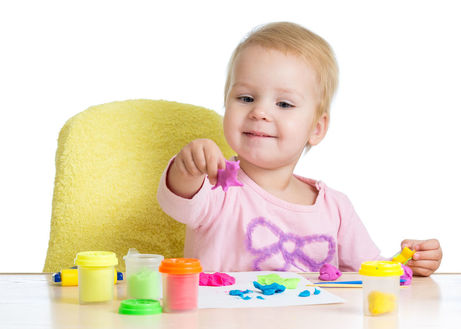 They may not present themselves with ground tremors or baby-powder breezes, but August and September are the busiest months for births. Did you know that Easterseals offers direct services to little ones ages birth to 3 years and their families? The program is Early Steps North Beaches, and it’s part of a statewide system of early intervention services for families with infants and toddlers who are not reaching age-appropriate milestones. Early Steps is a Florida Department of Health program overseen locally by Easterseals of Northeast Central Florida. Within the program is Early Steps North Beaches, which serves Volusia, Flagler, Lake, Sumter, and Putnam county families. Annually, more than 2,500 children ages birth to 3 years are referred to Early Steps North Beaches by hospitals, physicians, community agencies and even parents themselves. Easterseals staff and volunteers operate the program in multiple locations and positions, to include service coordinators, speech therapists, development specialist and administrative management and support. At Early Steps, early intervention is provided to support families and caregivers to empower them to help their children learn developmentally appropriate skills where they live learn and play. Thus, most Early Steps interventions are home visits. The purpose of Early Steps North Beach is to ensure that families of children with disabilities are equipped to enhance the development of their children within their everyday routines, activities and places. Early Steps North Beaches is funded by federal resources made available under the Individuals with Disabilities Education Act, and is used after Medicaid, private insurance and third-party funds have been applied. Evaluation of prospective families includes an examination of the child’s physical domains, cognitive abilities, gross and fine-motor skills, communication abilities, social and emotional development and self-help skills. Interested in learning more about Early Steps North Beaches? Those with questions about Early Steps and caregivers are seeking an evaluation for their child can contact one of the Early Steps office below for a referral and to set up an evaluation appointment. Evaluations are provided at no cost to families. Early Steps North Beaches 1673 Mason Ave., Ste 100 Daytona Beach, FL 32117 386-873-0365 Toll-free 877-255-4568 Early Steps DeLand 156 McGregor Road DeLand, FL 32720 386-873-3658 Early Steps Bunnell 301 Justice Lane Bunnell, FL 32110 386-254-1248 Early Steps Lake, Sumter, Putnam 1300 Citizens Blvd., Suite 300 Leesburg, FL 34748 352-323-0612 8/13/2018 Alinker walking bike makes active lifestyles a reality for those with disabilitiesRead Now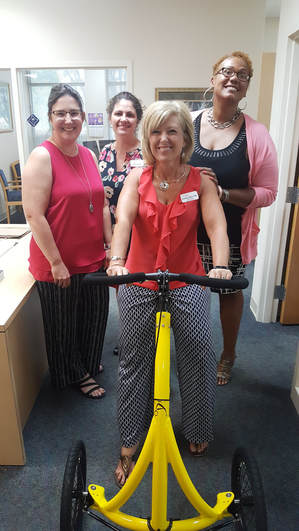 It can be discouraging to no longer be able to enjoy activities we once did as the result of disabilities. And, anyone is prone to losing self-confidence when excluded from physical experiences others are having. Why should anyone be left out of the fun? Thankfully, for thousands of individuals, the Alinker walking bike has changed this narrative and has created opportunities for physical activity, social inclusion and emotional well-being for those with disabilities. The Alinker was designed by Barbara Alink, a Dutch designer, architect and humanitarian. She aimed to design something for her aging mother who was resistant to walkers and scooters. Through two incredibly successful crowdfunding efforts, The Alinker is now available around the world, including right here in central Florida! The Alinker is a non-motorized walking bike – without pedals – that allows for low-impact and strength-building physical exercise. When a person’s riding the bike, they are eye-level with companions riding traditional bikes, allowing users to feel included in the experience. The Alinker is designed to allow for independent operation without assistance, too, and is lightweight and foldable for easy transport. Dorothy Lefford, VP of Clinical Services for Easterseals of Northeast Central Florida, recently acquired a sure-to-be-famous Alinker bike. She’s excited about seeing her clients’ reactions to the freedom and mobility offered by the walking bike. “It’s totally great! It allows people who might need a walker with a seat to continue walking WITH a seat in a more socially acceptable manner," said Lefford. "You sit upright and at you’re at eye-level – and the greatest thing – it’s COOL! You can go to Disney World, you can sit and move along with your friends and family on this all day long. And, it’s great for endurance, too.” Together with Alinker and inventors like Barbara Alink, we can challenge assumptions about people with disabilities, be more inclusive and help everyone reach their fullest potential. 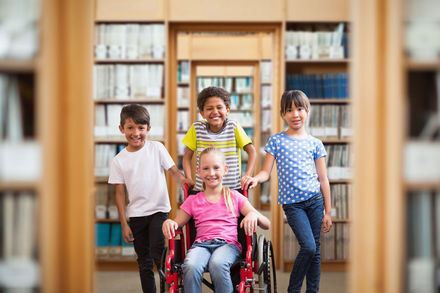 In our neck of the woods, the 2018-19 school year is about to be at full throttle. Parents have sharpened the No. 2 pencils, stocked backpacks, purchased polo shirts and planned lunches. But, are these children ready to reconnect with their schoolmates with disabilities in ways that makes them feel comfortable with their questions and compassionate in their actions? Easterseals of Northeast Central Florida encourages parents to discuss with their children how to think about and connect with people with disabilities. What can parents teach their children about disabilities? What should they say? Here are four suggestions on what to keep in mind when you talk to your child about their peers (and others) with disabilities: 1. Words are important. Teach your child the appropriate words to use when talking about the differences they may see in others, such as “disability,” “special needs,” or even the name of a specific disability like Down Syndrome or Autism. Teach your child that name calling is not acceptable, and neither are jokes at a person’s expense. Always encourage your child to use respectful language - or “people first” language - when talking about a person with disabilities. Ex, a friend with autism versus an autistic friend; a child who uses a wheelchair versus a wheelchair bound child. 2. A person with a disability is not necessarily sick. Educate you child that they cannot “catch” a disability from someone else. Though an illness can cause a disability, reassure your child that the disability is not a sickness. 3. Your child has things in common with others who have disabilities. Everyone has differences, it’s just that some differences are more noticeable. Instead, focus on what your child and others have in common: eyes, hands, smiles, feelings, etc. And, though someone may have a physical disability does not mean they have a cognitive one. Adults and kids with disabilities can do many things people without those challenges can do, it just may take them a little bit longer or they may accomplish the task in a different way. 4. Questions are allowed and welcomed! Children are naturally curious, and it’s one of the things we love about kids! Encourage your child to ask you questions, and if you don’t know the answer, Easterseals is always here to help. (Call us at 386-255-4568.) Or, pass your child’s question along to a teacher or the child’s parent. Most parents would invite an opportunity to bridge the gap between their child and yours. Your child is looking to you to guide them on how to interact with others, including those with disabilities. Be a strong example by showing respect and kindness. When you do, you join Easterseals in changing the way the world defines and views disability – whether physical, intellectual, emotional or social – by making profound, positive differences in people's lives everyday. Sources: Easterseals, today.com, scarymommy.com, care.com |
Details
Archives
May 2024
Categories
All
|

 RSS Feed
RSS Feed